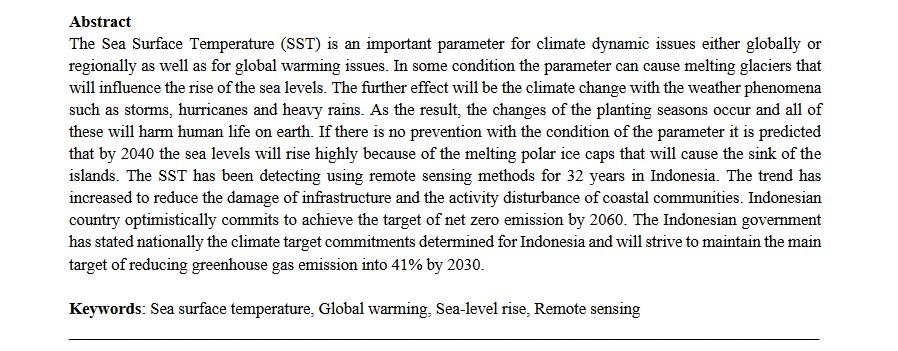Literature Study on Conditions of Sea Surface Temperature and Seawater Rise in Indonesia Detected by Remote Sensing
DOI:
https://doi.org/10.53848/ssstj.v10i2.390Keywords:
Sea surface temperature, Global warming, Sea-level rise, Remote sensingAbstract
The Sea Surface Temperature (SST) is an important parameter for climate dynamic issues either globally or regionally as well as for global warming issues. In some condition the parameter can cause melting glaciers that will influence the rise of the sea levels. The further effect will be the climate change with the weather phenomena such as storms, hurricanes and heavy rains. As the result, the changes of the planting seasons occur and all of these will harm human life on earth. If there is no prevention with the condition of the parameter it is predicted that by 2040 the sea levels will rise highly because of the melting polar ice caps that will cause the sink of the
islands. The SST has been detecting using remote sensing methods for 32 years in Indonesia. The trend has increased to reduce the damage of infrastructure and the activity disturbance of coastal communities. Indonesian country optimistically commits to achieve the target of net zero emission by 2060. The Indonesian government has stated nationally the climate target commitments determined for Indonesia and will strive to maintain the main target of reducing greenhouse gas emission into 41% by 2030.
References
Al Tanto, T. (2020). Deteksi suhu permukaan laut(SPL) menggunakan satelit. Jurnal Kelautan: Indonesian Journal of Marine Science and Technology, 13(2), 126-142.doi:10.21107/jk.v13i2.7257
Alfajri, A., Mubarak, M., & Mulyadi, A. (2017).Analisis spasial dan temporal sebaran suhu permukaan laut di perairan Sumatera Barat. Dinamika Lingkungan Indonesia, 4(1),65-74. doi:10.31258/dli.4.1.p.65-74
Ariani, R. (2018). Analisa kenaikan muka air laut di perairan Indonesia menggunakan data altimetri Topex/Poseidon dan Jason Series tahun 1993-2018, Tugas Akhir. Institut Sepuluh Nopember Surabaya. Retrieved from https://repository.its.ac.id/55856/7/03311440000049-Undergraduate_Thesis.pdf
Azizah, A., & Wibisana, H. (2020). Analisa temporal sebaran suhu permukaan laut tahun 2018 hingga 2020 dengan data citra Terra Modis. Jurnal Kelautan, 13(3), 196-205.doi:10.21107/jk.v13i3.7550
Cheng, L., Abraham, J., Trenberth, K. E., Fasullo, J.,Boyer, T., Locarnini, R., ... Zhu, J. (2021).Upper oceans temperatures hit record high in 2020. Advances in Atmospheric Science, 38(4),523-530. doi:10.1007/s00376-021-0447-x
Dwi Ayu, R. A., Sukojo, B. M., & Jaelani, L. M.(2011). Studi perubahan suhu permukaan laut menggunakan satelit Aqua Modis.Geoid,7(1),073-078.doi:10.12962/j24423998.v7i1.4223
Emiyati, Setiawan, K. T., Manopo, A. K. S.,Budiman, S., & Hasyim, B. (2014). Analisis multitemporal sebaran suhu permukaan laut di perairan Lombok menggunakan data penginderaan jauh MODIS. Buku Prosiding Seminar Nasional Penginderaan Jauh (pp.470-479). Retrieved from http://repositori.lapan.go.id/1557/1/Prosiding_E miyati_Pusfatja_2014.pdf
Gaol, J. L., Tambunan, E., Osawa, T., Pasaribu, B.,& Nurjaya, I. W. (2017). Sea level rise impact on eastern coast of North Sumatra, Indonesia. 2nd International Forum on Sustainable Future in Asia, 2nd NIES International Forum.Bali, Indonesia.Retrieved fromhttp://repository.ipb.ac.id/handle/123456789/103633
Handoko, E. Y., Yuwono, & Ariani, R.(2020).Analysis kenaikan muka air laut Indonesia tahun 1993-2018 menggunakan data altimetri.Geoid, 15(1), 58-64.doi:10.12962/j24423998.v15i1.3958
Mansawan, A. A., Lumban-Gaol, J., & Panjaitan, J.P. (2016). Variation and trend of sea level derived from altimetry satellite and tide gauge in Cilacap and Benoa coastal areas. International Journal of Remote Sensing and Earth Sciences, 13(1), 59-66 doi:10.30536/j.ijreses.2016.v13.a2703
Mayasari, O. S., & Handoko, E. Y. (2010). Analisa sea level rise dari data satelit altimetri Topex/Poseidon dan data Sea Surface Temperature menggunakan software BRAT 2.0.0; Studi kasus perairan Indonesia. Geoid,5(1), 39-47.doi:10.12962/j24423998.v5i1.7329
Mujadida, Z., Setiyono, H., Handoyo, G., Hariyadi,H., & Marwoto, J. (2021). Analisis dinamika permukaan laut di Laut Jawa dengan Recurrent Neural Network periode 1993 sampai 2019.Indonesian Journal of Oceanography, 3(1),100-110. doi:10.14710/ijoce.v3i1.10661
Mulyani, A. S. (2021a). Antisipasi terjadinya pemanasan global dengan deteksi dini suhu permukaan air menggunakan data satelit. Centech, 2(1), 22-29.doi:10.33541/cen.v2i1.2807
Mulyani, A. S. (2021b). Pemanasan global,penyebab, dampak dan antisipasinya.Retrieved from http://repository.uki.ac.id/4908 /1/PEMANASANGLOBAL.pdf
Putra, I. N. J. T., Karang, I. W. G. A., & Putra, I. D.N. N. (2019). Analisis temporal suhu permukaan laut di perairan Indonesia selama 32 tahun (Era AVHRR). Journal of Marine and Aquatic Science, 5(2), 234-246.doi:10.24843/jmas.2019.v05.i02.p11
Reuters. ( 2021) . Indonesia optimistic of reaching net zero emissions by 2060 or earlier.Retrieved from https: / / www. reuters. com/ business/ environment/ indonesia- optimistic-reaching- net- zero- emissions- by- 2060- or-earlier-2021-07-27/
Sulaiha, F., Handoko, E. Y., & Yuwono, Y. (2020).Studi variasi permukaan laut Jawa dan laut China selatan tahun 2002-2019 menggunakan dataaltimetri Jason. Geoid, 15(2), 172-178.doi:10.12962/j24423998.v15i2.6953
Syaifullah, M. D. (2015). Suhu permukaan laut perairan Indonesia dan hubungannya dengan pemanasan global. Jurnal Segara, 11(2),103-113. doi:10.15578/segara.v11i2.7356
Tampubolon, A. B., & Gustin, O. (2016). Pemetaan suhu permukaan laut Menggunakan Citra Satelit Aqua Modis di perairan Provinsi Kepulauan Riau. Politeknik Negeri Batam.doi:10.13140/RG.2.2.11693.08161
Triana, V. (2008). Pemanasan global. Jurnal Kesehatan Masyarakat, 2(2), 159-163.doi:10.24893/jkma.v2i2.26

Downloads
Published
How to Cite
Issue
Section
License
Copyright (c) 2023 Suan Sunandha Rajabhat University

This work is licensed under a Creative Commons Attribution 4.0 International License.











